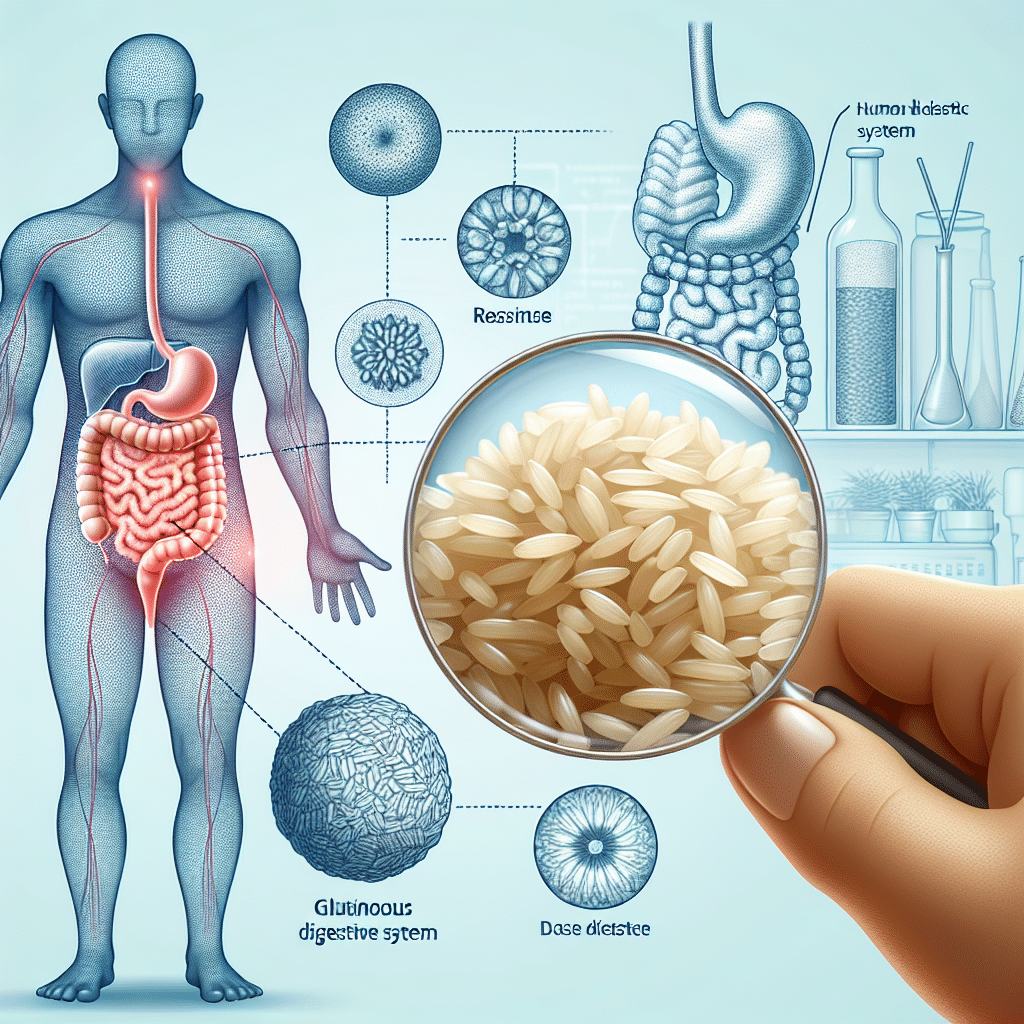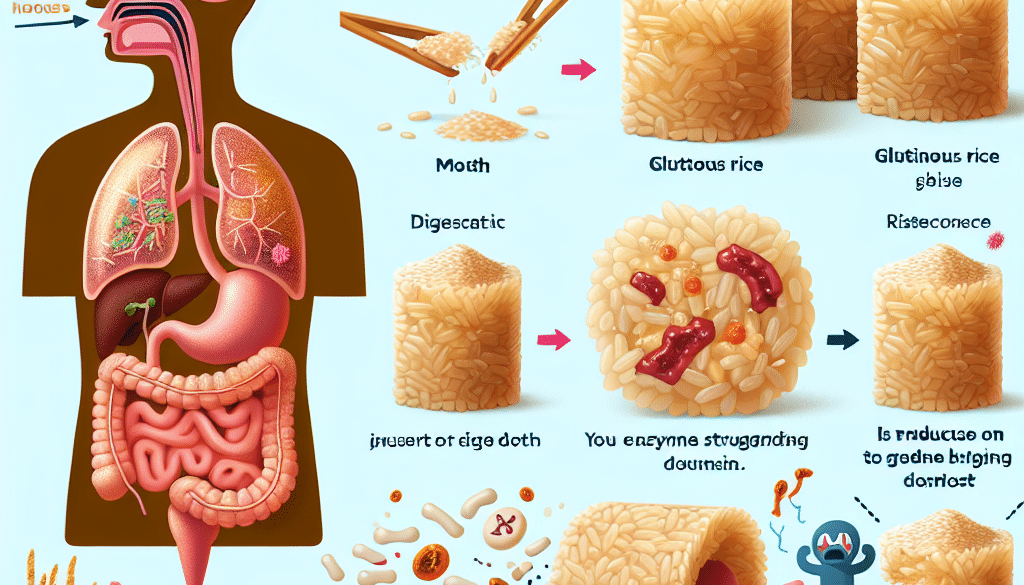Why Is Glutinous Rice Hard To Digest?
-
Table of Contents
- Glutinous Rice Digestibility: Understanding the Challenges
- Composition of Glutinous Rice
- Starch Structure and Digestibility
- Enzymatic Breakdown of Starches
- Glycemic Index and Its Role
- Individual Digestive Health
- Preparation Methods and Digestibility
- Alternatives to Glutinous Rice
- Conclusion: Balancing Enjoyment and Digestive Comfort
- Discover ETprotein’s Protein Products
Glutinous Rice Digestibility: Understanding the Challenges

Glutinous rice, also known as sticky rice, is a staple in many Asian cuisines, known for its unique texture and ability to hold together, making it an essential component of dishes like sushi and mochi. Despite its popularity, some individuals find glutinous rice harder to digest compared to other types of rice. This article delves into the reasons behind the digestive challenges posed by glutinous rice and provides insights into its nutritional profile.
Composition of Glutinous Rice
Understanding the composition of glutinous rice is key to comprehending why it might be harder to digest. Glutinous rice is distinct from other types of rice due to its high amylopectin content, a type of starch that gives it its sticky texture. The proportion of amylopectin to amylose, another starch component, is much higher in glutinous rice than in non-glutinous varieties.
Starch Structure and Digestibility
The structure of starch in glutinous rice directly impacts its digestibility. Starches are composed of long chains of glucose molecules, and the structure of these chains can vary. Amylopectin, with its highly branched structure, is more resistant to digestion because it is less accessible to digestive enzymes. This resistance can lead to slower digestion and, for some people, discomfort or a feeling of heaviness after eating.
Enzymatic Breakdown of Starches
The human digestive system uses enzymes like amylase to break down starches into simpler sugars that can be absorbed. However, the unique structure of amylopectin in glutinous rice can inhibit the efficiency of these enzymes, leading to a slower and potentially incomplete breakdown of the starch, which may contribute to digestive issues.
Glycemic Index and Its Role
Glutinous rice has a higher glycemic index (GI) than many other types of rice, meaning it can cause a more rapid increase in blood sugar levels. This rapid rise and subsequent fall in blood sugar can affect digestion and overall energy levels, potentially leading to a cycle of hunger and overeating that can further strain the digestive system.
Individual Digestive Health
Individual differences in digestive health can also play a role in how well one can digest glutinous rice. Factors such as the presence of digestive disorders, enzyme deficiencies, or variations in gut microbiota can all influence how effectively one’s body can process glutinous rice.
Preparation Methods and Digestibility
The way glutinous rice is prepared can also affect its digestibility. Traditional preparation methods, such as soaking and fermenting, can help break down some of the resistant starches, making the rice easier to digest. However, these methods are often bypassed in modern cooking, potentially leading to a harder-to-digest final product.
Alternatives to Glutinous Rice
For those who struggle with digesting glutinous rice, there are alternatives. Non-glutinous rice varieties, such as basmati or jasmine rice, have a different starch composition that may be easier on the digestive system. Additionally, whole grain options like brown rice provide dietary fiber that can aid in digestion.
Conclusion: Balancing Enjoyment and Digestive Comfort
While glutinous rice is a culturally significant and beloved food, its unique starch composition can make it challenging for some to digest. By understanding the factors that contribute to its digestibility, individuals can make informed choices about their diet and preparation methods to enjoy glutinous rice without discomfort.
Discover ETprotein’s Protein Products
If you’re looking for alternatives to support your digestive health, consider ETprotein’s range of protein products. Their selection includes organic rice protein, which may offer a more digestible option for those sensitive to glutinous rice. ETprotein’s products are characterized by a neutral taste, non-GMO, and allergen-free attributes, ensuring high-quality protein sources for various dietary needs.
About ETprotein:
ETprotein, a reputable protein and L-(+)-Ergothioneine (EGT) Chinese factory manufacturer and supplier, is renowned for producing, stocking, exporting, and delivering the highest quality organic bulk vegan proteins and L-(+)-Ergothioneine. They include Organic rice protein, clear rice protein, pea protein, clear pea protein, watermelon seed protein, pumpkin seed protein, sunflower seed protein, mung bean protein, peanut protein, and L-(+)-Ergothioneine EGT Pharmaceutical grade, L-(+)-Ergothioneine EGT food grade, L-(+)-Ergothioneine EGT cosmetic grade, L-(+)-Ergothioneine EGT reference grade and L-(+)-Ergothioneine EGT standard. Their offerings, characterized by a neutral taste, non-GMO, allergen-free attributes, with L-(+)-Ergothioneine purity over 98%, 99%, cater to a diverse range of industries. They serve nutraceutical, pharmaceutical, cosmeceutical, veterinary, as well as food and beverage finished product distributors, traders, and manufacturers across Europe, USA, Canada, Australia, Thailand, Japan, Korea, Brazil, and Chile, among others.
ETprotein specialization includes exporting and delivering tailor-made protein powder and finished nutritional supplements. Their extensive product range covers sectors like Food and Beverage, Sports Nutrition, Weight Management, Dietary Supplements, Health and Wellness Products, and Infant Formula, ensuring comprehensive solutions to meet all your protein needs.
As a trusted company by leading global food and beverage brands and Fortune 500 companies, ETprotein reinforces China’s reputation in the global arena. For more information or to sample their products, please contact them and email sales(at)ETprotein.com today.












